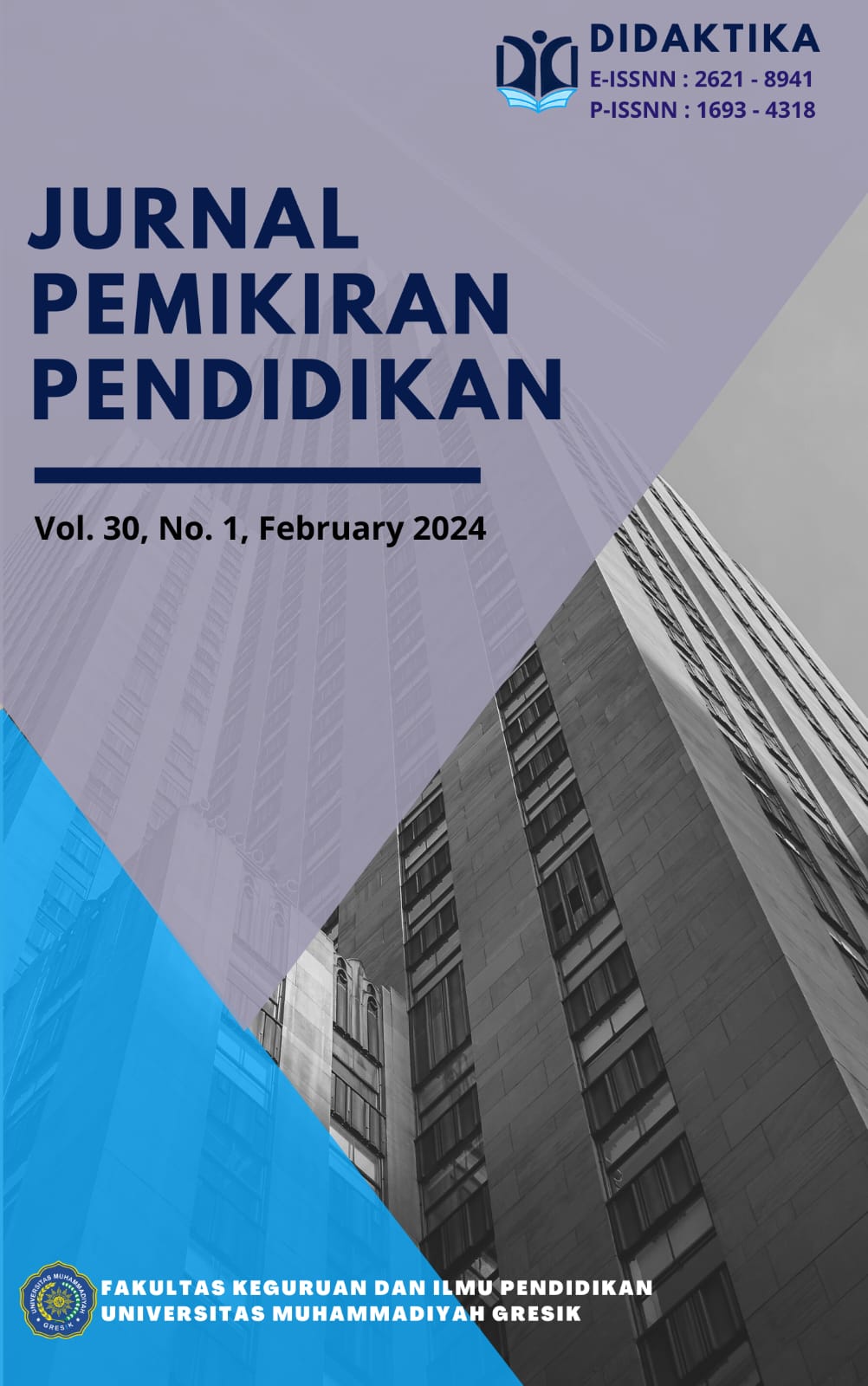Pengembangan Lembar Kerja Peserta Didik dengan Geogebra untuk Materi Teorema Pythagoras Kelas VIII SMP Muhammadiyah 1 Gresik
DOI:
https://doi.org/10.30587/didaktika.v30i1.7066Keywords:
student worksheets, Pythagorean theorem, GeogebraAbstract
Penelitian ini bertujuan untuk mengembangkan lembar kerja peserta didik dengan bantuan aplikasi Geogebra yang dapat meningkatkan pemahaman mata pelajaran secara keseluruhan dari hasil belajarnya. Metode yang digunakan dalam penelitian ini adalah model Four-D yang dimodifikasi (Define, Design, Develop). Subyek penelitian ini adalah beberapa peserta didik kelas VIII SMP Muhammadiyah 1 Gresik. Instrumen penelitian yang digunakan adalah soal pre test dan post test, wawancara pendidik, angket kebutuhan peserta didik, angket peserta didik pasca uji coba, dan lembar validasi ahli media dan materi. Hasil analisis data penelitian pengembangan ini menunjukkan bahwa LKS dengan kriteria 1) Sangat Valid baik dari validasi ahli materi dengan persentase 81,82% dan validasi ahli media dengan persentase 82,35%. 2) Layak dari angket peserta didik yaitu 70,37% jawaban memenuhi kebutuhannya. 3) Tuntas dari hasil pretest dan posttest seluruh peserta didik di kelas, dengan nilai rata-rata 90,83 dari pretest dan 93,75 dari posttest. Dengan demikian, pengembangan LKS dengan Geogebra dapat dijadikan sebagai pendamping pembelajaran untuk memperkuat pemahaman peserta didik.
References
BSNP. (2006). Panduan Penyusunan Kurikulum Tingkat Satuan Pendidikan Jenjang Pendidikan Dasar dan Menengah. Jakarta: Badan Standar Nasional Pendidikan
Darusalam, A. (2015). Pengembangan media pembelajaran berbasis web interaktif (blog) untuk meningkatkan motivasi belajar pada mata pelajaran pemasaran online sub kompetensi dasar merancang website (studi pada siswa kelas X tata niaga SMK Negeri 2 Nganjuk). Jurnal Pendidikan Tata Biaga (JPT). 3(2).
Depdiknas. (2008). Peraturan Pemerintah Nomor 19 Tahun 2005 tentang Standar Nasional Pendidikan. Jakarta: Departemen Pendidikan Nasional.
Hannafin, Micahel, J. & Peck, Kyle L. (1988). The Design, Development, and Evaluation of Instructional Software. New York: Macmillan Publishing Company.
Izzulhaq, Agung. (2019). Pembuktian Teorema Pythagoras. https://www.kimiamath.com/post/pembuktian-teorema-pythagoras diakses pada 1 April 2023.
Jean Piaget. (2002). Tingkat Perkembangan Kognitif. Jakarta: Gramedia.
Kurniawati, Nindi. (2018). Pengembangan Media Pembelajaran Lembar Kerja Peserta Didik (LKPD) Berbantuan Geogebra Pada Materi Turunan. Skripsi. Lampung: UIN Raden Intan. http://repository.radenintan.ac.id/4297/1/SKIPSI%20NINDI%20KURNIAWATI.pdf diakses pada 25 Oktober 2023.
Novitasari, Dwi, dkk. (2021). Pengembangan LKPD Berbasis Geogebra Untuk Meningkatkan Pemahaman Konsep Matematika. Jurnal Edukasi dan Sains Matematika (JES-MAT) 7 (1), hlm. 1-16.
Riduwan. (2013). Dasar-dasar Statistika. Bandung: Alfabeta.
Saffitri, Nadiyya, dkk. (2022). Efektivitas Penggunaan LKPD Discovery Learning Berbantuan Geogebra Terhadap Kemampuan Pemahaman Konsep Bangun Ruang Sisi Datar. Jurnal Penelitian Pembelajaran Matematika Sekolah (JP2MS). 6(3), hlm.351-361. DOI: https://doi.org/10.33369/jp2ms.6.3.351-361 diakses 26 Oktober 2023.
Sartorius von Waltershausen, Wolfgang. (1856). Gauss zum Gedächtniss (dalam bahasa Jerman). S. Hirzel
Suherman, dkk. (2003). Strategi Pembelajaran Matematika Kontemporer. Bandung: PT Remaja Rosdakarya.
Tanzimah. (2019). PEMANFAATAN GEOGEBRA DALAM PEMBELAJARAN MATEMATIKA. Prosiding Seminar Nasional Pendidikan Program Pascasarjana Universitas PGRI Palembang. https://jurnal.univpgri-palembang.ac.id/index.php/Prosidingpps/article/view/3091/2910 diakses 21 Februari 2024.
Wahyudin. (2008). Pengembangan Media Pembelajaran Matematika Berbasis Web pada materi Lingkaran bagi siswa kelas VIII. 15(1) : 65.
Downloads
Published
How to Cite
Issue
Section
License
License and Copyright Agreement
In submitting the manuscript to the journal, the authors certify that:
- They are authorized by their co-authors to enter into these arrangements.
- The work described has not been formally published before, except in the form of an abstract or as part of a published lecture, review, thesis, or overlay journal.
- That it is not under consideration for publication elsewhere,
- That its publication has been approved by all the author(s) and by the responsible authorities – tacitly or explicitly – of the institutes where the work has been carried out.
- They secure the right to reproduce any material that has already been published or copyrighted elsewhere.
- They agree to the following license and copyright agreement.
Copyright
Authors who publish with DIDAKTIKA: Jurnal Pemikiran Pendidikan agree to the following terms:
- Authors retain copyright and grant the journal right of first publication with the work simultaneously licensed under a Creative Commons Attribution License (CC BY-SA 4.0) that allows others to share the work with an acknowledgment of the work's authorship and initial publication in this journal.
- Authors are able to enter into separate, additional contractual arrangements for the non-exclusive distribution of the journal's published version of the work (e.g., post it to an institutional repository or publish it in a book), with an acknowledgment of its initial publication in this journal.
- Authors are permitted and encouraged to post their work online (e.g., in institutional repositories or on their website) prior to and during the submission process, as it can lead to productive exchanges, as well as earlier and greater citation of published work.
Licensing for Data Publication
Open Data and Software Publishing and Sharing
The journal strives to maximize the replicability of the research published in it. Authors are thus required to share all data, code or protocols underlying the research reported in their articles. Exceptions are permitted but have to be justified in a written public statement accompanying the article.
Datasets and software should be deposited and permanently archived inappropriate, trusted, general, or domain-specific repositories (please consult http://service.re3data.org and/or software repositories such as GitHub, GitLab, Bioinformatics.org, or equivalent). The associated persistent identifiers (e.g. DOI, or others) of the dataset(s) must be included in the data or software resources section of the article. Reference(s) to datasets and software should also be included in the reference list of the article with DOIs (where available). Where no domain-specific data repository exists, authors should deposit their datasets in a general repository such as ZENODO, Dryad, Dataverse, or others.
Small data may also be published as data files or packages supplementary to a research article, however, the authors should prefer in all cases a deposition in data repositories.











